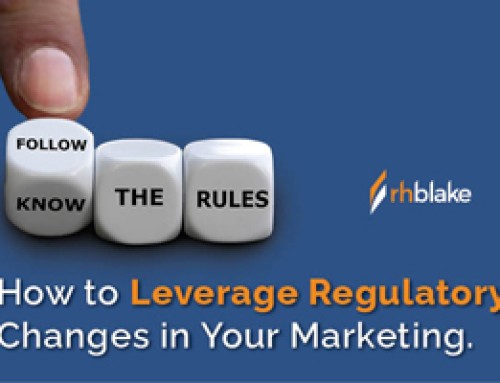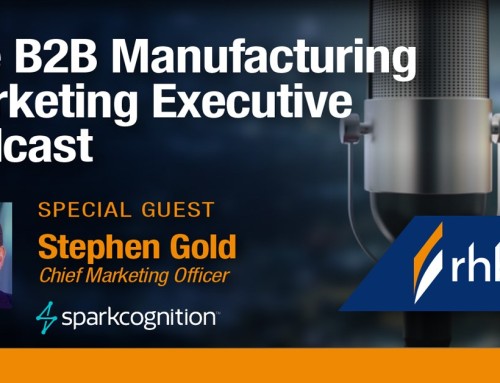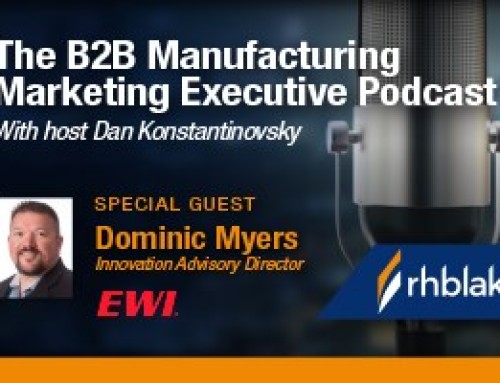Interview with Eric Schlau
Welcome to the B2B Manufacturing Marketing Executive Podcast.
If you want to learn how leading B2B Marketers are achieving excellent growth results, you are in the right place. This episode is brought to you by R. H. Blake a leading B2B and manufacturing focused marketing agency. To learn more, visit rhblake.com. Now here is your host Dan Konstantinovsky.
Thank you, everybody out there listening today wanted to welcome you to the B2B Manufacturing Marketing Executive podcast hosted by our RH Blake. Today we have a special guest. His name is Eric Slough, and you guys are in for a treat. Eric’s a marketing operations analyst for Concentric, and they are forklift and critical power company that specialize in engineering uptime for manufacturers and distributors so they can focus on their core business while Concentric focuses on theirs. His background, spans a variety of marketing disciplines, both traditional and non-traditional, among numerous industries HVAC, construction, food and beverage and management consulting.
About Eric Schlau
 Eric Schlau is a marketing operations analyst for Concentric – a forklift and critical power company that specializes in engineering uptime for manufacturers and distributors, so they can focus on their core business. His background spans a variety of marketing disciplines (both traditional and nontraditional), among numerous industries — HVAC and construction, food and beverage and management consulting.
Eric Schlau is a marketing operations analyst for Concentric – a forklift and critical power company that specializes in engineering uptime for manufacturers and distributors, so they can focus on their core business. His background spans a variety of marketing disciplines (both traditional and nontraditional), among numerous industries — HVAC and construction, food and beverage and management consulting.

About Eric Schlau
Eric Schlau is a marketing operations analyst for Concentric – a forklift and critical power company that specializes in engineering uptime for manufacturers and distributors, so they can focus on their core business. His background spans a variety of marketing disciplines (both traditional and nontraditional), among numerous industries — HVAC and construction, food and beverage and management consulting.
Thanks Dan for having me. I appreciate the invite.
It compares. I mean, the construction and HVAC industry, there’s somewhat industrial, but it compares with my expectations. I mean, the content can be a little dry sometimes. But, you know, what really gets me fired up is prospecting and sale enablement – really figuring out who to target and how and how to go about pursuing them and then working closely in sales and doing so. So that’s what I really enjoy.
Sure. So with the current firm we’re working with, they have a saying that “narrow the focus and expand the yield”. So really having clarity on who your customer is and what their problems are, rather than the “spray and pray” approach of going after everyone and everything. Really figure out who you don’t want to work with and ultimately; if you do, focus on less prospect with greater intent and more intensity, you’ll yield more results and will be a better quality…if that makes sense.
Sure. So we’re still a very young company, a young brand. We’re only about a year old. And of course, we do persona interviews, but we really heavily rely on the years of forklift battery data that that we’ve that we’ve recorded the past 30 years. And it basically gives us a story for each customer we work with as to how the factory floor runs. The battery and telematics basically give us a picture of how they operate and then we design solutions specifically based on that data. So that gives us a lot of insight into the world of the customer and we try to leverage that as much as possible.
Eric Schlau
Marketing Operations Analyst
Concentric
Yes, definitely with our case studies, we try to use that data as well as our positioning as well. You know, a lot of our competitors, everybody has data but it’s a matter of what you do with it. And in our case, our track record precedes itself.
Many manufacturers have an engineering team, but not many distributors have it in-house engineering team like we did. So we have the years of experience and the internal expertise to really back it up.
Definitely with some of our diagnostic tools, we recently came out with a cost calculator that basically the customer will put in, you know, the number of shifts they run, the number of batteries they have for a forklift truck, the average life of their batteries. And basically, once they submit this information based on the algorithms that we’ve created and the data that we historically have, we will send them an email that details #1, their total cost of ownership on an annual basis and then #2 their total cost of ownership on a lifetime basis, which we based off the age of the battery…if that makes sense.
The majority are pretty open. Some don’t want to disclose that information, especially if they’re there on the site level because, you know they may feel threatened or they may feel that that they possibly could be doing a better job of managing their forklift. But for the most part, I would say they are willing. I mean, in some cases, we’ve even had, after we provide a proposal, we had some customers try to reverse engineer the solution that we’ve provided with our proposal. So that’s something we also have to watch out for too.
Well, you guys probably put together some pretty thorough proposals for customers to try to leverage in that way.
So this assessment, it sounds like it’s becoming, or maybe is already, a kind of a key part of your marketing program. In general how do you make sure that the content, or programs like this obviously are content as well, you created as high-quality and effective? Are there any measurements or maybe indicators that you guys use to figure out what’s working and what’s not?
I mean you definitely want to know who you’re writing for and what you want to achieve. When it comes to our content, we’re no different than any other marketers out there. I mean, we have our own challenges internally with it. And to be honest, again, we’re still a young brand so there’s still a lot of a lot of fine-tuning that needs to be done and I guess you never really arrive. Of course, there’s a lot of content that we have out there that doesn’t get used up it at all by the sales team and I know we aren’t alone in that regard as well. But besides the activity metrics that you can track the HubSpot and within your CRM, you know so that is what we go off of for the most part, and then, of course, verbal feedback from our sales team so that is another way to go about it too.
Well, right now is somewhat sporadic. You know, I try to have as many as many one off conversations I
can with sales people. We actually just had a content meeting the other day with our with our sales group where I talked about the buyer’s journey and then I matched content to the buyer’s journey specific to us. So, you know, here are certain types of content that you can use within our sales cycle. At the end of that meeting, I asked if they would be open to quarterly content meeting and their response was “yes, we would like quarterly content meeting”. So I’m starting to implement more of that structure right now.
We stayed the course for the most part with our outreach and cadence. I know they’re just like everybody else. They’re having difficulty getting people on the phone and getting people to answer emails with all these new prospects.
And I know I know we’re not alone in that regard. People are working from home. They aren’t necessarily on site or at the facilities. But in certain industries, like we have a lot of food processing and manufacturing companies that produce canned goods. So certain industries have really taken off and they’re busy. And that means that they need our support now more than ever, while other industries maybe have kind of scaled back. And really all companies have had kind of adopted that messaging that says, you know, “we’re here for you in uncertain times”. And we did a little bit of that. But after a while, it really starts to become disingenuous, you know, so we’re trying to find our footing and still trying to prospect on a regular basis.
No!
So I think one you really have to offer – you really have to give the person you’re interviewing some context as to what your goals are, get some background information. Then really ask a lot of open ended questions and really focus on – the who, what, why, where, when and how. Also use other third party sources that can help the interview process as well. We as marketers, we can’t really be experts in everything. So we heavily lean on our current marketing partners to do some of the heavy lifting as well when it comes to writing up and publishing content.
Sure. Again, I think before really diving into tactics and an actionable marketing activity, I think it really is so important to understand who your customer is, a guy named and their pain points and then really determine those segments that you want to go after before anything happens. So I think that that’s something we’re still in the midst of and I don’t think it ever ends. But I think that is the most important thing strategically to have nailed down before you start executing. So I would say that that’s the biggest part to a strong marketing foundation.
So it’s a combination of some qualitative research. Yes… it’s interviewing our sales team, as well as serving our current customer base. And then also, again, persona interviews as well.
We are definitely aligned from that perspective. RH Blake in general has a kind of a strategy first mantra where we feel that marketing programs are significantly more effective if you can get that initial strategy working. To your point, the persona, we’re kind of dialed in so it’s nice to hear that.
So going back to your relatively new in the industrial marketing field, what would you give to maybe others in a similar kind of position as you – newly hired marketing leaders? What are maybe some of the first things that you’d recommend they focus on? I don’t know, 60 or 90 days on the job.
Yes, so this is something that I’ve definitely struggled with, you know, being comfortable with being uncomfortable, I think is very important as well, as well as being kind to yourself.
It takes a while to learn a job and a while to learn an industry. And really, again, rather than focusing on what’s new and shiny – read trade journals, interview your customers and really have an open mind. So I think I think that that’s what my advice would be.
Perfect. And then maybe just kind of the last question here, who maybe some of your marketing inspirations and this can be people – this can be companies. But are there folks out there or companies out there that, you know, you like that you make it a point to see what they’re up to from a marketing perspective.
So going back to your relatively new in the industrial marketing field, what would you give to maybe others in a similar kind of position as you – newly hired marketing leaders? What are maybe some of the first things that you’d recommend they focus on? I don’t know, 60 or 90 days on the job.
Man … that’s a tough question. There is so much content out there when it comes to B2B marketing. It’s unbelievable. I don’t think our problem as a society is the lack of information – it’s really what to do.
The things that I’ve been drawn to lately, Predictable Prospecting by Mary Lou Tyler, that that really gave me a lot of juice when I first started. I think James Soto of Industrial Strength Marketing is pretty good. Some of his takes. Doug David of American Business Development is also pretty good. And then there’s a combination of three different books and sales philosophies that all kind of feed off one another. The Business Selling by Neil Rackham, of course, is a classic. Then also the Challenger Sale within the past 10 years and also Insight Selling. I think those three books are really good resources in the sales and marketing environment that we’re operating in today.
Perfect…absolutely. We’ll definitely link to those in the transcripts and the notes. Well, Eric, thank you so much for your time and your insights. This has been extremely interesting and really appreciated the opportunity to speak with you and learn a little bit more about your background in how you guys are marketing for Concentric. So thank you very much.
Sure. Absolutely. Dan, I appreciate it. Thanks for your time.







